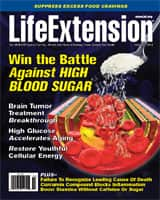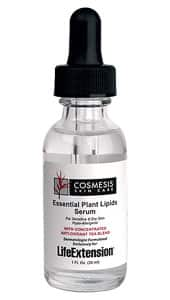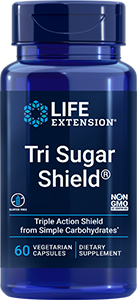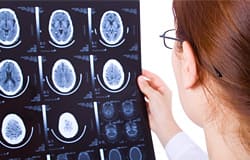Creatine shows promise in Huntington disease
Tuesday, February 11, 2014. A trial conducted at Massachusetts General Hospital has uncovered a benefit for creatine in delaying the symptoms of the inherited neurodegenerative disorder known as Huntington disease in asymptomatic adults. Mutation of a gene that expresses the huntingtin protein interferes with energy production, depleting adenosine triphosphate (ATP) and damaging the brain. Creatine, an over-the-counter nutritional supplement, aids in the restoration of ATP and the maintenance of cellular energy. The findings will be published in the March 11, 2014 issue of the journal Neurology.
The trial included 109 men and women with a family history of Huntington disease, some of whom were aware of carrying a mutated form of the gene that causes the disease. The trial design permitted subjects to enroll without being informed of their status. In addition to 19 participants who were aware of carrying the disease mutation, 26 of the 45 additional subjects were identified by the researchers as carriers. "More than 90 percent of those in the United States who know they are at risk for Huntington disease because of their family history have abstained from genetic testing, often because they fear discrimination or don't want to face the stress and anxiety of knowing they are destined to develop such a devastating disease," commented lead author Herminia Diana Rosas, MD, of the MassGeneral Institute for Neurodegenerative Disease. "Many of these individuals would still like to help find treatments, and this trial design allows them to participate while respecting their autonomy, their right not to know their personal genetic information."
For the double-blinded portion of the trial, half of the participants received a placebo and the remainder received 15 to 30 grams creatine per day, depending upon their tolerance to the compound, for six months. This was followed by a 12 month open-label period in which some of the participants who received a placebo were switched to creatine. Assessments of safety and other factors, in addition to magnetic resonance imaging (MRI) scans which evaluated any effects of creatine on progressive brain pathology, were periodically conducted.
Creatine was found to be safe and well-tolerated by the majority of those who received it. At the end of the placebo-controlled phase of the trial, the rate of atrophy in the brain's cortex and striatum among pre-manifest Huntington disease carriers as determined by MRI was slower among those who received creatine than among the placebo group, who experienced progression. This benefit was also observed among presymptomatic subjects who began creatine supplementation after the placebo-controlled phase.
"The results of this trial suggest that the prevention or delay of Huntington disease symptoms is feasible, that at-risk individuals can participate in clinical trials – even if they do not want to learn their genetic status – and that useful biomarkers can be developed to help assess therapeutic benefits," stated senior author Steven Hersch, MD, PhD. "In addition, we believe our study design sets an important precedent for other genetic diseases and will help inform discussions of how clinical research can coexist with deep concerns about genetic privacy and patient autonomy."
|
 |
What's Hot
Researchers from the Salk Institute for Biological Studies and the University of California, Irvine report the discovery of the ability of the compound fisetin to slow disease progression and reduce premature death in experimental models of Huntington disease, a neurodegenerative disorder. The findings were published online on October 15, 2010 in Human Molecular Genetics.
Salk Cellular Neurobiology Laboratory senior staff scientist Pamela Maher, PhD and her associates had previously found that fisetin, which occurs in vegetables and fruit such as strawberries, activates the Ras/ERK pathway, which is important in brain development and cognition, and is less active in Huntington disease. Administration of fisetin to cultured nerve cells that expressed a form of the huntingtin protein which is mutated in Huntington disease resulted in the survival of cells whose numbers would have otherwise been diminished by half within a few days.
In another experiment, fruit flies that overexpressed mutant huntingtin protein in brain neurons, which reduces life span and causes defective eye development, regained their normal life span and had less eye defects after consuming fisetin. A third experiment in a mouse model of Huntington disease found a 30 percent increase in life span and a delay in motor defects in animals that received fisetin. Further research by the team revealed a similar benefit for resveratrol, a polyphenol related to fisetin. "Fisetin, resveratrol and related compounds might be useful for the treatment of Huntington disease by virtue of their unique ability to activate ERK," the authors conclude.
Dr Maher noted that in Huntington disease "Cells are damaged and dying before there are overt symptoms. If patients know they have the mutation, then they could potentially start treatment before the start showing symptoms, which might be more effective than waiting for the symptoms to appear, as many do now." |
 |
Highlight
Life Extension Magazine® February 2014 Issue

- On the Cover
- Reports
- Departments
- Journal abstracts
|
 |
Latest Products |
 |
|
Renowned dermatologist Gary Goldfaden, M.D., has developed novel solutions for the most common skin problems encountered by maturing adults. Based on extensive clinical testing, these formulas are designed with potent antioxidant tea extracts (red, green, and white) to correct specific areas of concern, such as the appearance of darkness and puffiness under the eyes, fine lines, rough skin, loose skin, and more. These products can be used in conjunction with any other skin treatments or products. They are specially formulated exclusively for Life Extension.
Essential Plant Lipids Reparative Serum is a fragrance-free, preservative-free complex of plant-derived lipids fortified with potent antioxidant tea extracts. This super reparative moisturizer is excellent for sensitive skin, allergy-prone individuals, and extremely dry skin. It is also recommended for minimizing scar formation from surgical procedures, and in the healing process of skin involved in peels and laser procedures. It is safe for frequent use. |
| |
 |
|
This blend of three, natural, active ingredients is formulated to help support healthy blood glucose (blood sugar) levels in those already within normal range and metabolic wellness. It begins with iodine, a trace element involved in the production of T3 (triiodothyronine) and T4 (thyroxine), two thyroid hormones primarily responsible for regulating metabolism.
Chromium is a critical micronutrient recognized for its vital role in maintaining healthy blood sugar levels in those already within normal range when used as part of a healthy diet.
Phase 3™ Sucrase Inhibitor is an L-Arabinose and Chromium GlycoProtein Complex. Sucrase is an enzyme that breaks down sucrose to fructose and glucose in the digestive tract for absorption into the bloodstream. Phase 3™ contains a phytonutrient called L-arabinose that affects sucrase digestion and works synergistically with chromium to support healthy blood sugar and insulin levels already within normal range.
Phase 3™ is used under license.
|
|
 |
Related Articles
|
|











